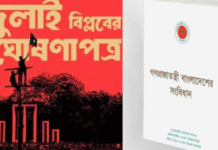Shamsul Bari
The most important impediment to progress has been the failure of all concerned to bring awareness about the tremendous reach of the law to people
This is usually the time of the year when some attention is given to the RTI Act 2009, which was hailed by many as the most revolutionary law of the land when it was formally adopted five years ago. As July 1, 2014 marks the completion of five years since the law entered into force, this year the anniversary is perhaps witnessing a little more focus than it did in the past.
Already a number of meetings, seminars, TV talk shows have been held on the subject while some articles have also appeared in the press. Some successes under the act have been highlighted, though, in general, pronouncements on the results obtained so far have not been very positive. It is important therefore to identify the reasons why.
It is not the objective of this note to go into a detailed analysis of the reasons here, but in order to set the context of the point I wish to make, I think it will be useful to draw attention on some key factors. Clearly, the most important impediment to progress has been the failure of all concerned to bring awareness about the tremendous reach of the law to people in general.
Five years since the law was enacted, very few people know that the act empowers all citizens, irrespective of their position in society, to monitor the work of the government and check its abuse of power. It can be used to ensure that public officials do their jobs in a transparent manner and in accordance with established laws, rules, and regulations. It can be used as a tool to make all public officials, including those working for many NGOs using public funds, accountable to citizens.
Even for those who are aware about the existence of the law, there is either distrust about its efficacy or disbelief that the public authorities would ever give up their age-old habit of keeping all official acts hidden from the people, except those that they want the people to know. There is still a general feeling that the term “information” in the act has more to do with news that media provides to the people and hence should be of main interest to the media.
Very few people realise that information in the context of the act has to do with the work of government offices and refers to the contents of all files, documents, agreements, decisions, papers, etc, at the disposal of government offices, in whatever form, be it printed, hand-written, electronic, digital, or physical. That people have a right to inspect all these as rightful owners of all powers in the land, as enshrined in the constitution, has hardly been explained to them.
The only people who have made use of the law so far and benefitted from it a great deal, it seems, are the most marginalised sections of the society. They have been helped in this regard by a few committed NGOs and RTI activists determined to make use of the law to help them realise their rightful claims under the law of the land.
However, as stated above, the overwhelming majority of the population, including the upper, middle, and educated classes, the professional groups including lawyers, the political parties, the media, and the civil society in general, have stayed away from resorting to the law so far. If this state of affairs is allowed to continue, the law will only stay on paper, unable to contribute to the realisation of the revolutionary objectives for which it was enacted, namely, transparent and accountable governance.
But this should not be allowed to happen. The situation can improve if particular attention is given, among other things, to the proper functioning of the Information Commission, which is the main body under the act to oversee its implementation. First of all, the commission should be helped by the government to function as an impartial and neutral body without any pressure or influence from the government or from anybody else.
Such a commission would send a strong message to all concerned that the government is genuinely committed to seeing the full flowering of the law. It will encourage the citizens to make proper use of the law without fear of retribution from public officials for daring to seek awkward information from them. At the same time, it will warn public officials that the days of keeping citizens in the dark about the work of the government are over, and it is time they change their traditional secretive mindset and open up to public scrutiny for the sake of good governance.
For this to happen, particular attention must also be given to the selection of information commissioners. Unfortunately the RTI Act 2009 does not provide much guidance on the qualification and background of persons who could/should be chosen for the job. It only provides for a selection committee for this purpose and how it would be composed. The focus here is more on representation from the three branches of the government, which is fine, but there is very little representation of ordinary citizens for whose benefit the law was enacted in the first place.
To redress the lacunae in the law, a good practice would be for the selection committee to ask citizens to suggest names to it so that it has a good list/range of persons to choose from. Such persons could be anybody, within the age limit, from any walk of life, known for their commitment, inter alia, to public cause, objectivity, wide-ranging knowledge and experience, social values, and a good sense of equity and justice.
Asking people to send SMS messages, or otherwise, to the secretary of the selection committee may be a quick and easy way out, from which the committee may select names which receive highest mention. Such a process may also help in view of the paucity of time left for replacement of two of the three commissioners who are going to retire this month after completion of their five-year term.
There may, of course, be other mechanisms that the committee may wish to consider, but whatever method is chosen, it must demonstratively be transparent to uphold the value of transparency in the work of all public authorities that the RTI Act 2009 seeks to promote.
Source: Dhaka Tribune









